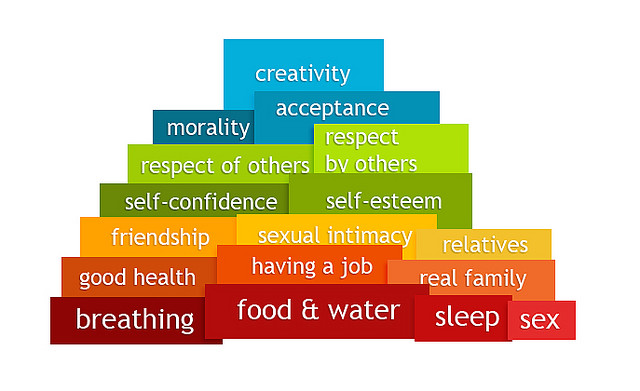
When Kurt Goldstein originally wrote about self-actualization in the late 1930’s, he talked referred to it as a “tendency to actualize, as much as possible, a person’s individual capacities.” According to Goldstein, self-actualization is the only drive by which the life of an organism is determined. Self-Actualization is the highest of personal accomplishments. This idea was included in what is known as Maslow’s hierarchy of needs. In 1943, Abraham Maslow published his hierarchy of needs in “A Theory of Human Motivation.” The hierarchy is made up of physiological, safety, love and belonging, esteem, and self-actualization needs. Each level must be accomplished before moving onto the next. The theory is very popular in sociology and management training.
Building a base requires accomplishing the first two levels.
The first level of the hierarchy is physiological. Physiological needs are those essential for survival. Things such as food, water, shelter, and clothing are among the individual goals that make up this base layer. After someone has secured all of the survival essentials, they can move onto their safety needs. This layer is includes your physical safety as well as financial, health, and any safety nets for accidents. This layer is generally associated with a healthy home live without any domestic violence or child abuse, a society that is free of war and natural disasters. Once adulthood is reached, this layer includes health insurance, life insurance, and job security to protect yourself from financial insecurity.
Finding emotional happiness is the focus of levels 3 and 4.
After a person has the physical objectives of the first two levels accomplished, they move onto level three, love and belonging. This need is so strong that it can be override safety as a need. This is seen in children who cling to abusive parents or victims of domestic abuse. These needs are important for large groups, such as a church community or group of co-workers, and small social groups like family or a close circle of friends. Once you feel a sense of belonging and love, the need for respect is addressed. Not only respect from others, but also self respect. Items like self-respect, competency, independence and confidence are among the highest versions of esteem and will over power items like status, fame, or prestige for most people. I say most people because even scientists can’t explain the actions that some people do for fame.
Millennials prioritize self-actualization more than previous generations.
 Millennials are consistently referred to as “the generation of me.” While not incorrect, it’s a broad understatement. Millennials have more access to information and choices than any generation before them. This has led to one of the defining characteristics of the generation. Millennials have had every answer to any question they’ve ever had with just a Google search. The social networks that are maintained through hundreds of people enable Millennials to share ideas and information with just about anybody including industry leaders, the President and the Pope. Millennials also tend to be self-confident, a cornerstone of level 4. This leads them to the next level of needs – self-actualization.
Millennials are consistently referred to as “the generation of me.” While not incorrect, it’s a broad understatement. Millennials have more access to information and choices than any generation before them. This has led to one of the defining characteristics of the generation. Millennials have had every answer to any question they’ve ever had with just a Google search. The social networks that are maintained through hundreds of people enable Millennials to share ideas and information with just about anybody including industry leaders, the President and the Pope. Millennials also tend to be self-confident, a cornerstone of level 4. This leads them to the next level of needs – self-actualization.
With so much information and options at their hands, Millennials are more likely to postpone some of life’s biggest decisions. This includes both starting a family and career. The median age for an American woman’s first marriage was 20.6 in 1967. In 2011, it was 26.9. Millennials have choices to start careers that were not available 10 years ago. If they want to try something new, the odds are you can do it on line in your spare time. For that reason, Millennials expect their jobs to not only pay the bills, but also to deliver a level of self-actualization. This is one of the reasons that 45% of Millennials will chose job-flexibility over pay when making a decision. They also focus on other through volunteer work. 20% of people under 30 volunteered in 2013, up from 14% in 1989.
With a new generation always comes new ideas. For Millennials, we’ve been to the moon, we haven’t experienced anything close to a World War, and we haven’t had nearly the distrust in the government and social activism that were so prevalent in the 60’s and 70’s. We’ve grown up with an unlimited amount of knowledge at our fingertips, and the traditional concepts of success don’t apply. The “generation of me” is focused on making sure that they are the best individual people that they can be. That’s exactly what Kurt Goldstein and Abraham Maslow wrote about in the 30s and 40s. The 1930s and 1940s.
-Tim
Photo: Dimitar Nikolov, Koshy Koshy
